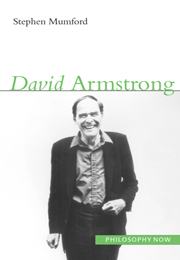Preface
Summary
David Malet Armstrong has a claim to being the greatest philosopher produced by the young and vast country of Australia. It is primarily through his work that Australian philosophy, and Australian metaphysics in particular, enjoys such a high reputation in the rest of the world. Students of an older generation will know of Armstrong chiefly as a philosopher of mind. He was one of the big three Australian materialists, who argued that our mental lives are nothing more that a series of states in our brains or central nervous systems. Not content with overturning centuries of thinking about the mind, however, Armstrong went on to have a second career as a philosopher. In providing his theory of mind, he came to see that we needed accounts of states, properties, dispositions, the nature of identity, causation and laws of nature. He saw that metaphysics was an area where serious work was yet to be done. Perhaps with the intention of being a better philosopher of mind, he became a metaphysician in the mid-1970s. He only seldom returned to his former discipline, however, perhaps seeing that metaphysics was where all the real action was.
This book aims to offer an introduction to the full range of Armstrong's thought for readers already familiar with the nature and methods of twentieth-century analytic philosophy. I have deliberately not, however, offered a purely chronological account of his work. I would maintain that Armstrong's chief philosophical achievement is the development of a core metaphysical programme, embracing the topics of universals, laws, modality and facts.
- Type
- Chapter
- Information
- David Armstrong , pp. vii - ixPublisher: Acumen PublishingPrint publication year: 2007



